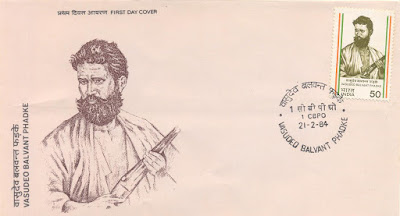Vasudeo Balwant Phadke (4 November 1845 – 17 February 1883) was an Indian Freedom Fighter who sought India's independence from Britain. Phadke was moved by the plight of the farmer community during British Raj. Phadke believed that Swaraj was the only remedy for their ills. With the help of Kolis, Bhils and Dhangars communities in Maharastra, Vasudev formed a revolutionary group called as Ramoshi. The group started an armed struggle to overthrow the British Raj. The group launched raids on rich English businessmen to obtain funds for their liberation struggle. Phadke came into limelight when he got control of the city of Pune for a few days when he caught the British soldiers off guard during one of his surprise attacks.
Phadke's plans to organize several simultaneously attacks against the British Raj nationwide were met with very limited success. He once had a direct engagement with the British army in the village of Ghanur, where the government offered a bounty for his capture. Not to be outdone, Phadke in turned offered a bounty for the capture of the Governor of Bombay, announced a reward for the killing of each European, and issued other threats to the government. He then fled to Hyderabad State to recruit Rohilla and Arabs into his organisation. A British Major, Henry William Daniell and Abdul Haque, Police Commissioner to the Nizam of Hyderabad, pursued the fleeing Phadke day and night. The British move to offer a bounty for his capture met with success: someone betrayed Phadke, and he was captured in a temple after a fierce fight at the district of Kaladgi on 20 July 1879 while he was on his way to Pandharpur.
From here he was taken to Pune for trial. Ganesh Vasudeo Joshi, also known as Sarvajanik Kaka, defended his case. Phadke and his comrades were housed in the district session court jail building, near Sangam bridge, which now happens to be the state C.I.D. building. His own diary provided evidence to have him sentenced for life. Phadke was transported to jail at Aden, but escaped from the prison by taking the door off from its hinges on 13 February 1883. But his escape was too short lived: he was recaptured and put back in prison. Phadke then went on a hunger strike to death. On 17 February 1883 Phadke breathed his last breath as a result of his protest hunger strike.

No comments:
Post a Comment